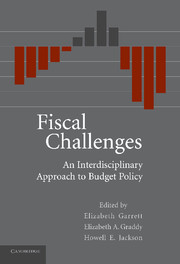Book contents
- Frontmatter
- Contents
- Preface
- Contributors
- PART ONE THE LAW AND POLITICS OF FISCAL POLICY
- PART TWO UNDERSTANDING FEDERAL DEFICITS AND PUBLIC DEBT
- 5 Economic Perspectives on Federal Deficits and Debt
- 6 Counting the Ways: The Structure of Federal Spending
- 7 Starving the Beast: The Political Psychology of Budget Deficits
- Part Two Bibliography
- PART THREE BUDGETING AND FISCAL CONSTRAINTS AT THE STATE LEVEL
- PART FOUR INTERGOVERNMENTAL ASPECTS OF BUDGET POLICY
- PART FIVE JUDICIAL POWERS AND BUDGET POLICY
- Index
5 - Economic Perspectives on Federal Deficits and Debt
Published online by Cambridge University Press: 23 December 2009
- Frontmatter
- Contents
- Preface
- Contributors
- PART ONE THE LAW AND POLITICS OF FISCAL POLICY
- PART TWO UNDERSTANDING FEDERAL DEFICITS AND PUBLIC DEBT
- 5 Economic Perspectives on Federal Deficits and Debt
- 6 Counting the Ways: The Structure of Federal Spending
- 7 Starving the Beast: The Political Psychology of Budget Deficits
- Part Two Bibliography
- PART THREE BUDGETING AND FISCAL CONSTRAINTS AT THE STATE LEVEL
- PART FOUR INTERGOVERNMENTAL ASPECTS OF BUDGET POLICY
- PART FIVE JUDICIAL POWERS AND BUDGET POLICY
- Index
Summary
INTRODUCTION
Are large deficits good, bad, or irrelevant? In fact, they can be each, depending upon circumstances. Large deficits potentially cause two separate but related problems: shifting the bill for financing the current generation's consumption to future generations and crowding out private investment. Thus, deficits are more problematic well into a solid economic expansion; when their impact is primarily on domestic investment and hence future income, rather than private saving or foreign capital imports; when the level of the national debt, the accumulation of all previous deficits, is high or rapidly rising toward high levels; when they finance consumption, not productive public investment; when they do not constrain future spending; or if they lead to inflationary monetary policy. So the net effect of the budget position in any given year likely reflects a balancing of these considerations. Despite all the rhetoric, serious deficit-induced economic problems are unlikely over the next decade, although longer-term budget problems are potentially far more serious.
Further, the usual nominal dollar measures of the deficit and debt can be extremely misleading. The deficit and debt must be compared to the size of the economy, a rough measure of its ability to service the debt. Thus, debt burdens often are proxied by the debt–GDP ratio. The deficit is affected heavily by the business cycle. Inflation erodes the value of the previously issued national debt; in other words, the real debt declines with inflation (and conversely increases with deflation).
- Type
- Chapter
- Information
- Fiscal ChallengesAn Interdisciplinary Approach to Budget Policy, pp. 141 - 184Publisher: Cambridge University PressPrint publication year: 2008
- 4
- Cited by

